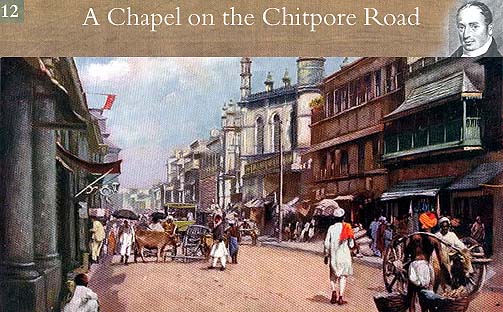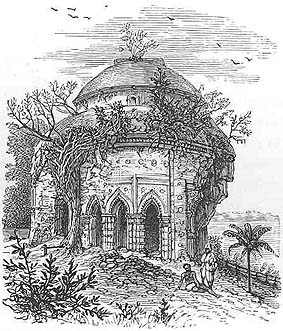

The Governor-General restricts the Mission's activities to Serampore On 23rd August, 1806, Captain Wickes in the 'Criterion' anchored off Calcutta with 2 new missionaries, Rev. John Chater, and William Robinson. The next day, the Captain delivered the list of passengers to the Police Office. The list corresponded with the one he had given the pilot at the mouth of the Hooghly, and he was informed that the Government had issued orders that Chater and Robinson were not to leave Calcutta.
The Governor-General, Sir George Barlow, issued instructions that, since he himself did not interfere with the prejudices of the neighbours, he required that Mr. Carey and his associates should do likewise. The missionaries were not to preach to the natives, or allow their converts to preach, they were not to distribute their pamphlets, nor allow others to distribute them, nor take any step by conversation, or otherwise, to induce the natives to embrace Christianity. This news filled Carey and his colleagues with anxiety, but it more particularly affected Ward as he had been exulting in the new prospects of usefulness in Calcutta. 'To shut up the Bow Bazaar preaching station' he writes 'is a cutting measure, and it has taken away all my desire to visit Calcutta.'
Opposition had been growing in Government to what was regarded as the destabilising influence of attempts to supplant the native religion. Events were soon to apparently prove this widely held view when the 'Vellore Mutiny' occurred in Southern India. It was many years before investigations proved that attempts to convert the natives had nothing to do with the cause of the 'Vellore Mutiny', but by then the damage had been done. The missionaries were restricted by Sir George Barlow to the confines of the Danish settlement and the Bow Bazaar chapel was closed.

'Henry Martyn's Pagoda, Aldeen, Serampore'. Courtesy 'The Centre for the Study of the Life and Work of William Carey D.D., 1761 - 1834.' In these circumstances it seems remarkable that Rev. Henry Martyn, the Anglican Chaplain's assistant, and an evangelical minister should be allowed to proceed to Dinagepore as Chaplain. A prayer-meeting was held at the 'Pagoda' in Serampore when Mr. Martyn, Mr Brown, Mr. Marshman and William Ward prayed for divine blessing on his labours. Ward gave Martin 'fifty Hindoostanee Testaments and 20,000 tracts, to begin his missionary career', which Martin distributed on his way to Dinagepore.
In their quarterly letter at the close of 1806 the missionaries record that the total number of converts since the inception of the Mission was 104, of whom 94 were natives; of these it had been necessary to exclude 13, and 6 had died. They had 10 native itinerants who could be sent out beyond Serampore, as the ban did not cover them - at least for the moment.
The subordinate mission stations were at Dinagepore, under Mr. Fernandez; Cutwa, under Mr. Chamberlain; Malda, temporarily occupied by Mr. Mardon.
They still held religious services in the private house they rented in Calcutta, and their Armenian friends had begun to erect a small room for native worship in the Chitpore Road, but the bungalow at Bow Bazaar was closed.
At the beginning of 1807 Fort William College was remodelled and reduced. A new college was established by the East India Company in England, at Haileybury, Hertfordshire. The period of study at Fort William College was reduced to 1 year, and the professorships were reduced to 3 - Hindi, Persian and Bengali. Carey had been ranked only as a teacher, but he was now raised to professor, with his salary doubled to £1,000.
On 25th January, 1807, Ward opened the little chapel on the Chitpore Road; a great thoroughfare through the native part of the city. It was simply a room in the house of one of their Armenian friends which was fitted out for public worship. In his journal he recognised the same satisfaction in preaching in this chapel as he had in the Bow Bazaar bungalow, little imagining that by the end of the year the Government would order the closure of this meeting house.
In a letter to Fuller, Ward noticed some small payments which had been paid to his mother in England he says:
'I hope the Society will not make any allowance to my mother unasked. I hope and believe she does not want. I wish to die leaving the Mission as much in my debt as possible; so that I may die poor, having received nothing from the Mission except food and raiment. Hitherto, I have spent my private property to do this, and noone shall stop my boasting in all Asia.'
To understand these remarks it must be remembered that he was contributing all the profits of the Printing Office to the Mission, and receiving from it a pittance, not enough to cover his personal expenses, the balance was made up from his own little fund he brought with him from England.